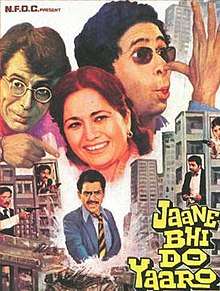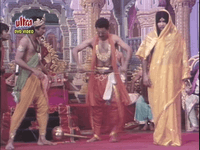Jaane Bhi Do Yaaro
Jaane Bhi Do Yaaro (Devnagari: जाने भी दो यारों, English: Just Let It Go, Friends) is a 1983 Hindi comedy film directed by Kundan Shah and produced by NFDC. It is a dark satire on the rampant corruption in Indian politics, bureaucracy, news media and business, and stars an ensemble cast including Naseeruddin Shah, Ravi Baswani, Om Puri, Pankaj Kapur, Satish Shah, Satish Kaushik, Bhakti Barve and Neena Gupta.[4][5]
| Jaane Bhi Do Yaaro | |
|---|---|
 Film poster | |
| Directed by | Kundan Shah |
| Produced by | NFDC |
| Written by | Ranjit Kapoor Satish Kaushik |
| Screenplay by | Sudhir Mishra Kundan Shah |
| Story by | Sudhir Mishra Kundan Shah |
| Starring | |
| Music by | Vanraj Bhatia |
| Cinematography | Binod Pradhan |
| Edited by | Renu Saluja |
Production company | |
| Distributed by | Ultra Media & Entertainment |
Release date | 12 August 1983[1] 2 November 2012[2] |
Running time | 132 min |
| Country | India |
| Language | Hindi |
| Budget | ₹ 8-9 lakh[3] |
Antonioni's film Blowup of 1966 inspired director Kundan Shah,[6][7] in which two photographers inadvertently capture the murder of a Bombay Municipal Commissioner with their cameras and later discover this when the images are enlarged. The park in which the murder occurs is named "Antonioni Park".
Kundan Shah won the 1984 Indira Gandhi Award for Best Debut Film of a Director for his work. The film was part of the NFDC Retrospective at India International Film Festival in 2006.[8]
Plot
Professional photographers Vinod Chopra (Naseeruddin Shah) and Sudhir Mishra (Ravi Baswani) open a photo studio in the prestigious Haji Ali area in Bombay, and hope to make enough money to keep it running. After a disastrous start, they are given some work by the editor of "Khabardar", a publication that exposes the scandalous lives of the rich and the famous. They accept it and start working with the editor, Shobha Sen (Bhakti Barve), on a story exposing the dealings between an unscrupulous builder, Tarneja (Pankaj Kapoor), and corrupt Municipal Commissioner D'Mello (Satish Shah). During their investigation, they find out that another builder Ahuja (Om Puri) who is Tarneja's business rival is also involved in this dealing to get a contract for building 4 flyovers from D'Mello.
While working on their story, Sudhir and Vinod decide to enter a photography contest that carries prize money of Rs. 5000/-, and take a number of photographs all over the city. On developing their pictures, in one of the photographs, they see a man shooting someone and realize that the killer is none other than Tarneja. They immediately return to the scene and find the body lying behind the bushes. Before the duo gets to the body, it disappears, but they manage to retrieve one of a pair of gold cufflinks. Sometime later, they attend the inauguration of a bridge dedicated to the memory of late Municipal Commissioner D'Mello who is supposed to have died of a terminal disease. There they discover the other cuff link. They return at night and dig up the area and unearth a coffin containing the dead body of D'Mello.

They take several photographs of the corpse, and wheel it with them with the hopes of exposing Tarneja. However, the body disappears and they lie to Shobha saying that the body is hidden safely with them. Shobha, in turn, starts blackmailing Tarneja. He invites her, Vinod and Sudhir for dinner and plants a time bomb to kill them. Unfortunately, the bomb explodes prematurely and the trio escapes.
Vinod and Sudhir find out that the body is with Tarneja's rival, Ahuja who had, in an inebriated condition, carried the coffin to his farmhouse. They steal the corpse but not before Tarneja, Ahuja, the new Municipal Commissioner Srivastav, Shobha and others also get involved resulting in a series of comic mix-ups.
The climax is set upon a stage dramatization of the Mahabharata, particularly the enactment of the Draupadi Cheer-Haran episode, which is turned on its head with the duo and the group following them inserting themselves into the scene. The iconic sequence also includes a scene from the ill-fated romance of Salim and Anarkali with the corpse playing Anarkali.
In the end, the police arrive and Vinod and Sudhir present their evidence to the police officer. Srivastava, being the Assistant Municipal Commissioner, tells the officer to wait a few minutes before arresting Tarneja. Tarneja tells Ahuja and Shobha that if he goes to jail, he would make sure that their malpractices are also exposed. In a twist ending, they all come to an agreement and Srivastava manages to pin the murder of Commissioner D'Mello and the collapse of the bridge on Vinod and Sudhir. In the final scene, Vinod and Sudhir are shown several months/years later released from prison, still in their prison clothes. They turn to the camera and make a symbolic cut-throat gesture, signifying the death of justice and truth.
Cast
- Naseeruddin Shah as Vinod Chopra
- Ravi Baswani as Sudhir Mishra
- Om Puri as Ahuja, a corrupt contractor
- Pankaj Kapur as Tarneja, a corrupt contractor who murders the Municipal Commissioner
- Satish Shah as D'Mello, Municipal Commissioner murdered by Tarneja
- Bhakti Barve as Shobha Sen, editor of the "Khabardar" magazine
- Rajesh Puri as Kamdar,Shobha Sen Assistant
- Satish Kaushik as Ashok Namboodirippad, Tarneja's assistant
- Neena Gupta as Priya
- Deepak Qazir as Srivastav, Assistant Municipal Commissioner
- Rajesh Puri as Kamdar, assistant editor of the magazine "Khabardar"
- Zafar Sanjari
- Ashok Banthia
- Vidhu Vinod Chopra as theater actor playing Dushasana
- Anupam Kher. voiceover for Architect Tulyaani at construction site
- Ajay Wadhavkar, Police Constable under the bridge
Reception
The film was not immediately successful at the box office when released, but was eventually regarded as a cult classic, which is reflected in a recent comment by Indian Express that film's high recall value even after 27 years, is due to "it(s) superb satirical depiction of the essential, timeless, human condition: supreme self-interest versus some moral/ethical anchor. What made the depiction particularly powerful was its setting: India of the early '80s".[10]
Re-release
A digitally restored print of the film was released on 2 November 2012 at selected theaters.[11] The film opened to an enthusiastic welcome from the media[12][13] and discerning filmgoers.
Awards
- 1984 : Indira Gandhi Award for Best Debut Film of a Director: Kundan Shah[14]
- 32nd Filmfare Awards
- Won Filmfare Best Comedian Award: Ravi Baswani
- Nominations
- Best Movie
- Best Director - Kundan Shah
- Best Comic Actor - Satish Shah
Trivia
- Blow-Up, a 1966 English-language film directed by Michelangelo Antonioni in which a photographer believes he may have witnessed a murder and unwittingly takes photographs of the killing, was an inspiration for Jaane Bhi Do Yaaro. The filmmakers paid homage by naming the park in which the murder occurs as "Antonioni Park".
- The names of the lead characters – Vinod Chopra and Sudhir Mishra – came from film directors Vidhu Vinod Chopra and Sudhir Mishra, who were assisting Kundan Shah in the movie.[15] Sudhir Mishra co-wrote the script and assisted in directing the movie, while Vidhu Vinod Chopra was the production controller of the film.
- Vidhu Vinod Chopra played Dushasana in the Mahabharata play in the climax of the movie. He also played a photographer in the first half of the film, where a group of journalists interviews Tarneja, played by Pankaj Kapoor.
Further reading
- Jaane Bhi Do Yaaro: Seriously Funny Since 1983, by Jai Arjun Singh. 2010. Harpercollins India. ISBN 978-93-5029-022-4.
See also
- Assassinations in fiction
References
- "Jaane Bhi Do Yaaro Movie". Times of India. Retrieved 1 August 2018.
- "Re-release of Jaane Bhi Do Yaaro historic moment: Kundan Shah". Firstpost. Retrieved 1 August 2018.
- "RARE PIX: The Making of Jaane Bhi Do Yaaro - Rediff.com Movies". Rediff.com. 1 November 2012. Retrieved 23 October 2013.
- "ANALYSIS: On-screen journos". Screen. 3 September 2004.
- "Cinemascoop". The Tribune. 20 February 2005.
- "Director's Perspective... Part I". NFDC(cinemasofindia). 14 May 2013. Retrieved 9 October 2017.
- "Celebrating 30 Years Of Jaane Bhi Do Yaaro With Filmmaker Kundan Shah At MFCC 2012". Comic Con India. 15 November 2012.
- Jaane Bhi Do Yaaron (Who Pays the Piper) Archived 23 February 2009 at the Wayback Machine India International Film Festival Official website.
- Singh, Jai Arjun (2012). Jaane Bhee Do Yaaro: Seriously Funny since 1983. HarperCollins Publishers. ISBN 9789350292785.
- "The tragic comedy of the '80s". The Indian Express. 30 July 2010. Retrieved 2 October 2012.
- "Cult classic Jaane Bhi Do Yaaro to tickle your funny bone again, re-releases today : Bollywood, News - India Today". Indiatoday.intoday.in. 2 November 2012. Retrieved 23 October 2013.
- "Review: Jaane Bhi Do Yaaro is the best film of the year - Entertainment - DNA". Dnaindia.com. 3 November 2012. Retrieved 23 October 2013.
- "'Jaane Bhi Do Yaaro' Review: Why the angry brand of heroism is still relevant". Ibnlive.in.com. 2 November 2012. Retrieved 23 October 2013.
- 'Jaane Bhi Do Yaaro' on NFDC website
- "Review: Jaane Bhi Do Yaaro: The Five-Star Classic - Rediff.com Movies". Rediff.com. 2 November 2012. Retrieved 23 October 2013.